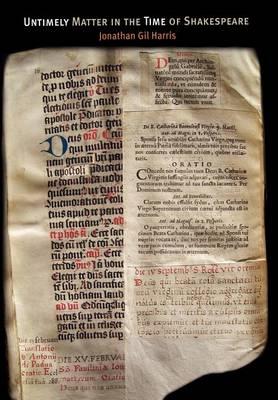Full Product Details
Author: Jonathan Gil Harris
Publisher: University of Pennsylvania Press
Imprint: University of Pennsylvania Press
Dimensions:
Width: 15.20cm
, Height: 2.00cm
, Length: 22.90cm
Weight: 0.582kg
ISBN: 9780812241181
ISBN 10: 0812241185
Pages: 288
Publication Date: 21 October 2008
Audience:
College/higher education
,
Postgraduate, Research & Scholarly
Format: Hardback
Publisher's Status: Active
Availability: In Print

This item will be ordered in for you from one of our suppliers. Upon receipt, we will promptly dispatch it out to you. For in store availability, please contact us.
Reviews
A stylish, readable, and important intervention in early modern studies. In recalling a past that never was, it invites us to a future that might not be the same. -Jonathan Goldberg, Emory University It is difficult to do justice here to the extraordinarily wide range of critical and theoretical models that Harris draws on, or the ease with which he brings them together... Harris's book is important ... not only for its fine discussions of individual works but also for setting a yardstick for the work that early modernists might do in this area, and for the form that a 'turn to time' might take. -TLS Excitingly-and excitedly-written, energetic and widely suggestive. In restoring to the discussion of historical objects their resistance to temporal fixities, Harris's book does cultural historians a service. -Renaissance Quarterly A deep, intelligent, thought-provoking book on the ways in which physical objects both inhabit and transcend time... This exciting book takes familiar texts and presents them in a new way. -Choice One of the most intellectually profound interventions into the field of Renaissance studies to appear in the last five to ten years. In challenging conventional understandings of historical time, Harris's book offers nothing less than a complete overhaul of current critical practice and persuades us to glimpse a scholarly future that is genuinely and excitingly new. -Renaissance Studies Untimely Matter in the Time of Shakespeare is rigorously researched, well argued and skillfully written, and follows its own argument by using the past to suggest alternative ways of imaging both present and future... Harris's book impresses with the depth and breadth of his knowledge, and the skill with which he brings together multiple branches of theoretical discourse to inform and advance his argument... One of the more significant works of literary scholarship of recent years. -Parergon
A stylish, readable, and important intervention in early modern studies. In recalling a past that never was, it invites us to a future that might not be the same. -Jonathan Goldberg, Emory University It is difficult to do justice here to the extraordinarily wide range of critical and theoretical models that Harris draws on, or the ease with which he brings them together... Harris's book is important, therefore, not only for its fine discussions of individual works but also for setting a yardstick for the work that early modernists might do in this area, and for the form that a 'turn to time' might take. -TLS A deep, intelligent, thought-provoking book on the ways in which physical objects both inhabit and transcend time... This exciting book takes familiar texts and presents them in a new way. -Choice
"""A stylish, readable, and important intervention in early modern studies. In recalling a past that never was, it invites us to a future that might not be the same.""--Jonathan Goldberg, Emory University"
A stylish, readable, and important intervention in early modern studies. In recalling a past that never was, it invites us to a future that might not be the same. -Jonathan Goldberg, Emory University It is difficult to do justice here to the extraordinarily wide range of critical and theoretical models that Harris draws on, or the ease with which he brings them together... Harris's book is important ... not only for its fine discussions of individual works but also for setting a yardstick for the work that early modernists might do in this area, and for the form that a 'turn to time' might take. -TLS Excitingly-and excitedly-written, energetic and widely suggestive. In restoring to the discussion of historical objects their resistance to temporal fixities, Harris's book does cultural historians a service. -Renaissance Quarterly A deep, intelligent, thought-provoking book on the ways in which physical objects both inhabit and transcend time... This exciting book takes familiar texts and presents them in a new way. -Choice One of the most intellectually profound interventions into the field of Renaissance studies to appear in the last five to ten years. In challenging conventional understandings of historical time, Harris's book offers nothing less than a complete overhaul of current critical practice and persuades us to glimpse a scholarly future that is genuinely and excitingly new. -Renaissance Studies Untimely Matter in the Time of Shakespeare is rigorously researched, well argued and skillfully written, and follows its own argument by using the past to suggest alternative ways of imaging both present and future... Harris's book impresses with the depth and breadth of his knowledge, and the skill with which he brings together multiple branches of theoretical discourse to inform and advance his argument... One of the more significant works of literary scholarship of recent years. -Parergon
Author Information
Jonathan Gil Harris is Professor of English at George Washington University and the author of Sick Economies: Drama, Mercantilism, and Disease in Shakespeare's England, also available from the University of Pennsylvania Press.




